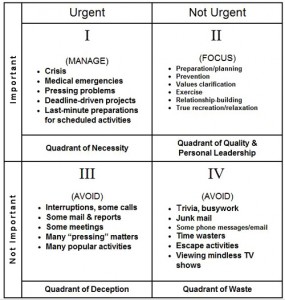
As a business owner, it’s important to always look at how to improve your and the team’s throughput while you become the most efficient person on the planet.
We know about the 80/20 rule – where 20% of efforts produce 80% of the results. Or, roughly 80% of the effects come from 20% of the causes. Amazingly, this holds true for pretty much everything in our professional and personal lives. Note to self: Take a look at my clients and current revenue. Which clients show the highest value/income? (Answer: about 20%)
For the Entrepreneur and small business operator, the biggest disruption to enter the 21st century is …the Internet. Sure, there are personal offline habits and issues to address – but with 24×7 accessibility from desktop to mobile devices – it’s easy to see how we can get “hooked”.
Check this statistic for Facebook for example:
In January 2012, social networking giant Facebook reported that users spend an average of 10.5 billion total minutes per day (this doesn’t include mobile users.)
Before we look at some online productivity tools that can help you, it’s important to learn more about the effective use of your time and habits. That includes planning and using a framework to change the way you do things today.
Many are familiar with Stephen Covey’s best-selling book “The 7 Habits of Highly Effective People”. The essence of his time management framework is shown as 4 quadrants of what’s urgent, not urgent, important, not important:
The core area of focus should move you towards quadrant 2, where the not urgent but important work lies. The results from Q2 work will be the most valuable for you and your business over time. Note: nobody expects you to move here overnight, it’s a process and requires changes in habits.
The Stephen Covey Time Matrix Defined:
- Quadrant I: Quadrant of Necessity. Urgent and important matters. Crises, pressing problems, deadline-driven projects. These are things we have and we have to do.
- Quadrant II: Quadrant of Quality and Personal Leadership. Non-urgent but important matters. Relationship building, planning, recognizing new opportunities, improvements to your workplace, exercise, recreation. These are things that needs to be done but we don’t do it because it is not urgent.
- Quadrant III: Quadrant of Deception. Urgent but not important things like phone calls, email, interruptions, popular matters, some meetings. Obviously, these things are not important and most people are deceived into doing these.
- Quadrant IV: Quadrant of Waste. Non-urgent and non-important matters. This includes trivia, spam, time wasters, distractions, non-productive activities.Totally a waste of time if you do these things.
I claim that the Internet and social networks have pushed us into quadrants III and IV and it has been accelerated by your own “bad” habits, seated years before the Interwebs came around.
It’s therefore crucial to re-think and re-learn the way you operate online. But, much like an athlete must train daily for the upcoming games, so do you.
From the list above – where do you stand today? (ACTION: Make one change this week to start!)
Here are some things to help you become more efficient:
1. Get a baseline understanding of your current world.
What are you spending time on now? Start with where you are… and for your Online Life – install Rescuetime. It will help you answer the question: “Am I really spending my days the way I want to?” Try https://www.yast.com to see how much time you spend on unimportant tasks.
2. To do lists.
Some will say these don’t work. However, planning is key. And, each day is a new opportunity. You must record and state what you will do. You’ll feel great when you check them off. Try ToDoist and RememberTheMilk. If you run a small business and need to track activity on a broader spectrum, try https://www.bitrix24.com. There is also basecamp and teamworkpm for more project management based systems.
3. Set the priorities.
Out of all the tasks and to-dos for the day — what are the most important ones? This will and should be something related to client and revenue activities.
4. One major project at a time.
Break things down, look at slicing the projects up into manageable pieces.
5. Eat that frog first.
We like to procrastinate. What’s not pleasant to deal with is normally pushed last (and doesn’t get done). Attack the projects you hate or don’t like first. You’ll feel better too. It’s likely impactful for those around you too.
6. Kick your own butt.
Set deadlines that you hold yourself accountable to. Since you are the boss you must do something to develop a carrot-and-stick routine in your week and month. Tell somebody you trust (or join a mastermind). And, don’t forget to make it fun too.
This should help you think about how to optimize your current work load and projects.
Finally – try https://www.sanebox.com to manage and restore sanity to your email inbox. If you use Gmail, there are many free add-ons as well. Check the Gmail Blog.
Please share this post if you like it.
